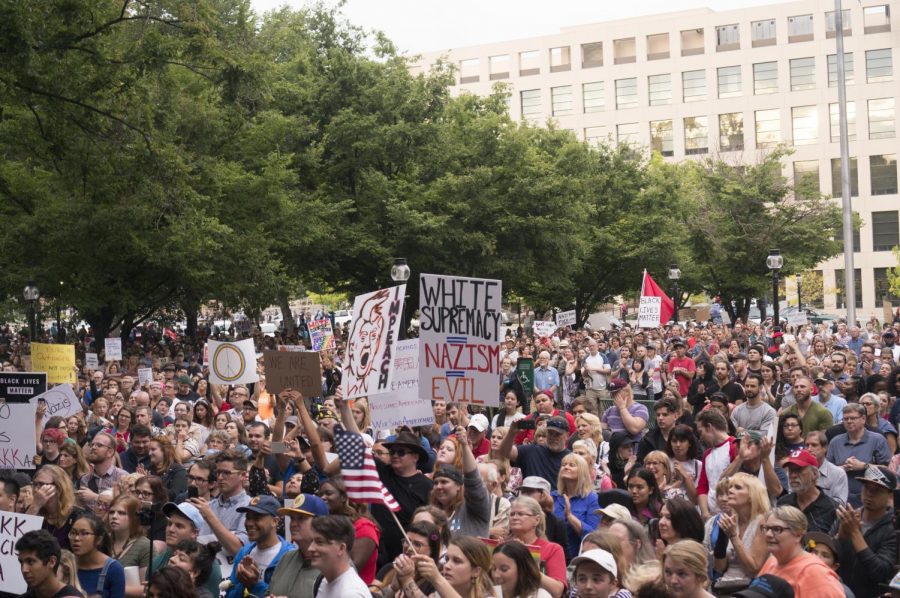Emery: Holocaust Education Will Inoculate Future Generations Against Hate
The crowd at the Solidarity Rally against racism at Washington Square Park in Salt Lake City on Monday, Aug. 14, 2017. (Photo by Rishi Deka | Daily Utah Chronicle)
March 7, 2020
The Salt Lake Tribune reported that, as of Feb. 2019, the number of active hate groups in Utah had tripled over the previous year. These groups have made their presence known across the state, and especially in Salt Lake City on the University of Utah campus.
There is a rise in the prevalence of hate that accompanies a steady decline in American’s knowledge and understanding of the Holocaust. State Rep. Patrice Arent, Utah’s only Jewish legislator, is running a resolution that encourages the State Board of Education to include the history of the Holocaust in curriculums across the state.
Those who have dedicated their lives to informing others about the horrors of the Holocaust implore us to “never forget” the crimes against humanity committed by Nazi Germany. But people cannot forget what they never learn, which is why it is so important that Arent’s resolution passes. Utah students need to understand the historical context of one of history’s most inhuman events so that they are equipped to resist hate in their own communities.
Knowledge about the Holocaust in the United States is exceptionally low, especially among the younger generations. A 2018 study found that one out of every five millennials have not heard, or are not sure they have heard, about the Holocaust. Almost half of Americans could not name a single ghetto or concentration camp that operated during World War II. Researchers found that 70% of Americans feel that fewer people care about the Holocaust than they used to, and almost 60% of Americans believe that something like the Holocaust could happen again. The only optimistic finding of this research was that 93% of Americans feel that the history of the Holocaust should be taught in schools.
In my experience as a high schooler in New Hampshire, the most frustrating part of the Holocaust curriculum was how decontextualized it was. There was a small discussion about Germany’s economy because of the Treaty of Versailles following the First World War, but other than that, the Holocaust was treated as an aberration — unrepeatable and truly distinct from anything that came before.
There was almost no discussion about how the Nazi Party rose to power through democratic means, or how they maintained their grip on power by silencing those who tried to speak out against them with force. Teachers never explained how early Nazis were directly inspired by Jim Crow Laws in the United States, or how the persecution of Jews and other minorities relates to broader systems of oppression. Placing the Holocaust in a box outside of the broader historical narrative is incredibly dangerous because it makes it too easy for people to dismiss the warning signs of hate.
Arent’s resolution is especially important at this point in time, when neo-Nazis march proudly in American streets. The resolution specifically emphasizes the important role of the individual in stopping the spread of hate. It reminds us that it is the duty of “citizens in democratic societies to combat misinformation, indifference and discrimination through tools of resistance such as protest, reform, and free and fair elections.”
There are many actions an individual can take, whether it is educating those in their community, taking direct action to oppose hate groups or standing up to politicians who seek to gain power through hate and division. It is important for the individual to realize that they cannot be a bystander to hate. History has shown that too many people are willing to look the other way when they do not have a broad historical understanding of the potential consequences of their decisions.
The education promoted by Arent’s resolution will be the most effective if the Holocaust is placed inside of the historical narrative, not separated from other events that occurred. This allows students to see the specific decisions made and actions taken in response. They can then determine for themselves how effective or ineffective those responses were. It would show students that the Holocaust was not a unique evil that occurred and could never be repeated, but that it is another example of the historic persecution that ethnic and religious minorities have faced worldwide.
Arent’s resolution is one of the most common-sense measures that could be implemented by the Utah State Legislature in this session. Hate groups rely on a cesspool of ignorance that breeds hate and division, and while Holocaust education receives overwhelming support, it has not been effectively implemented. Draining this cesspool by educating students would make Utah a safer place for everyone. While this education may not convert every bigot in Utah into an active defender of human liberties, it would give many young people the tools to identify, recognize and organize against hate in their communities.







